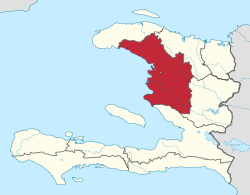Artibonite (department)
Artibonite
Latibonit | |
|---|---|
 Artibonite in Haiti | |
| Country | |
| Capital | Gonaïves |
| Government | |
| • Type | Departmental Council |
| Area | |
| • Department | 4,986.94 km2 (1,925.47 sq mi) |
| Population (2015)[1] | |
| • Department | 1,727,524 |
| • Density | 350/km2 (900/sq mi) |
| • Urban | 739,787 |
| • Rural | 987,737 |
| Time zone | UTC-5 (Eastern) |
| ISO 3166 code | HT-AR |
Artibonite is one of the ten departments (French: départments, singular départment) of Haiti. It is named Artibonite because the Artibonite river flows across the department from east to west. Its capital is Gonaïves.
The independence of Haiti was proclaimed in the Place d'Armes of Gonaïves on 1 January 1804 by Jean Jacques Dessalines.
Geography
[change | change source]The Départment de l'Artibonite, with an area of 4,895 km²,[2] is the largest department of Haiti.
The main river of the department is the Artibonite. Other rivers are Ennery, de l'Estère, Montrouis, Quinte.
The mountain chains here run from west to east and the most important are the Chaine de Terre-Neuve and the Montagnes Noires (in English, "Black Mountains"). There is also part of the Chaine des Mattheux.
It is bordered to the northwest by the Nord-Ouest Department, to the north and northeast by the Nord Department, to the east by the Centre Department and to the south by the Ouest Department. The Gulf of Gonâve is to the west.
Population
[change | change source]The department had, in the 2003 census, a population of 1,299,398 persons: 625,690 men and 673,708 women, with 422,476 (32.51%) living in cities and towns.[3]
The main cities are Gonaïves (the capital) and Saint-Marc.
Administrative division
[change | change source]The department is divided into five arrondissements (like districts) and 15 communes (like municipalities). The "arrondissements" and their "communes" are:
- Dessalines
- Desdunes
- Dessalines
- Grande Saline
- Petite Rivière de l'Artibonite
- Gonaïves
- Ennery
- Estère
- Gonaïves
- Gros-Morne
- Anse Rouge
- Gros-Morne
- Terre-Neuve
- Marmelade
- Marmelade
- Saint Michel de l'Attalaye
- Saint-Marc
- La Chapelle
- Saint-Marc
- Verettes
Economy
[change | change source]Most of the rice of Haiti is grown in the Artibonite department, along the valley of the River Artibonite.
References
[change | change source]- ↑ "Population Totale" (PDF). Archived from the original (PDF) on 2015-11-06. Retrieved 2017-06-20.
- ↑ "Départments géographiques d'Haïti". Haiti-Référence (in French). Archived from the original on 28 January 2010. Retrieved 24 October 2009.
- ↑ "Le 4ième Recensement Géneral de la Population et de l'Habitat" (PDF) (in French). Institut Haïtien de Statistique et d'Informatique. Archived from the original (PDF) on 27 August 2010. Retrieved 24 October 2009.
| ||||||
| Artibonite • Centre • Grand'Anse • Nippes • Nord • Nord-Est • Nord-Ouest • Ouest • Sud • Sud-Est | ||||||
